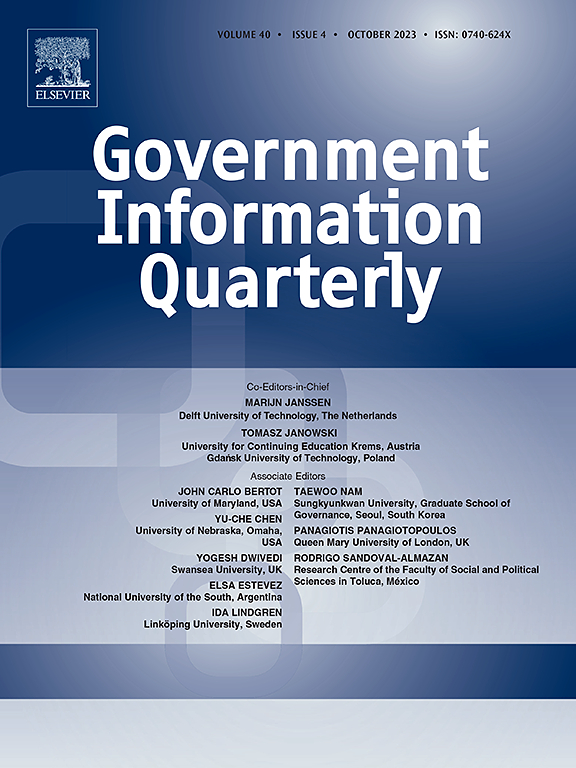AI-augmented government transformation: Organisational transformation and the sociotechnical implications of artificial intelligence in public administrations
IF 10
1区 管理学
Q1 INFORMATION SCIENCE & LIBRARY SCIENCE
引用次数: 0
Abstract
Implementing artificial intelligence (AI) in public settings requires a fundamental transformation of various social and technical aspects within public administration. However, the transformative efforts required for AI integration and use in government remain underexplored. This study introduces the concept of 'AI-augmented government transformation,' building on sociomateriality and sociotechnical theory, and develops a theoretical framework to explore this phenomenon. By applying this framework and drawing insights from expert interviews, we identify the strategic shifts and socio-technical adaptations essential for integrating AI into public administrations. Our analysis highlights the importance of opening the 'black box' of AI to gain a deep understanding of its underlying technologies and their materialities.
The findings reveal complex interdependencies between AI materiality and the social and technical systems that public administrations must navigate. Specifically, AI, as a novel materiality, introduces new organizational dynamics, enhances employee capabilities, and alters operational routines and practices. These changes complement technical ones, such as upgrades and advancements in data collection and processing. By investigating the complexities of AI-augmented government transformation, this research offers novel and practical insights for policymakers and practitioners navigating the challenges and opportunities of AI integration.
人工智能增强的政府转型:公共行政部门的组织转型和人工智能的社会技术影响
在公共环境中实施人工智能(AI)需要在公共行政的各个社会和技术方面进行根本性的转变。然而,政府整合和使用人工智能所需的变革努力仍未得到充分探索。本研究在社会物质性和社会技术理论的基础上引入了“人工智能增强政府转型”的概念,并建立了一个理论框架来探讨这一现象。通过应用这一框架并从专家访谈中获取见解,我们确定了将人工智能纳入公共行政所必需的战略转变和社会技术适应。我们的分析强调了打开人工智能的“黑匣子”以深入了解其底层技术及其材料的重要性。研究结果揭示了人工智能重要性与公共行政部门必须驾驭的社会和技术系统之间复杂的相互依存关系。具体来说,人工智能作为一种新的重要性,引入了新的组织动态,提高了员工的能力,并改变了运营惯例和实践。这些变化补充了技术上的变化,例如数据收集和处理方面的升级和进步。通过研究人工智能增强政府转型的复杂性,本研究为决策者和实践者提供了新颖而实用的见解,以应对人工智能整合的挑战和机遇。
本文章由计算机程序翻译,如有差异,请以英文原文为准。
求助全文
约1分钟内获得全文
求助全文
来源期刊

Government Information Quarterly
INFORMATION SCIENCE & LIBRARY SCIENCE-
CiteScore
15.70
自引率
16.70%
发文量
106
期刊介绍:
Government Information Quarterly (GIQ) delves into the convergence of policy, information technology, government, and the public. It explores the impact of policies on government information flows, the role of technology in innovative government services, and the dynamic between citizens and governing bodies in the digital age. GIQ serves as a premier journal, disseminating high-quality research and insights that bridge the realms of policy, information technology, government, and public engagement.
 求助内容:
求助内容: 应助结果提醒方式:
应助结果提醒方式:


